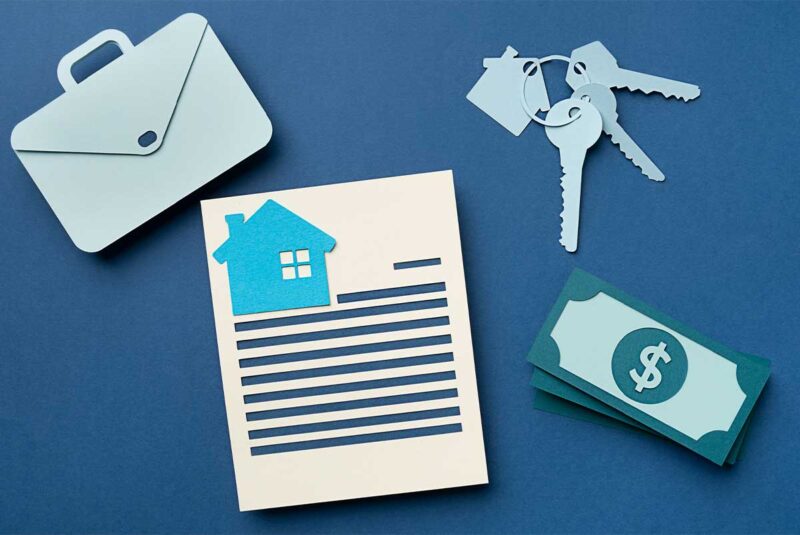Ready To Buy a Home?
Get Approved to Buy a Home
Rocket Mortgage® lets you get to house hunting sooner.
Getting a mortgage preapproval letter is one of the best ways to show prospective sellers that you’re serious about – and capable of – buying a home. However, many consumers are unfamiliar with the process of getting preapproved for a mortgage. Fortunately, learning how to get preapproved is not nearly as complicated as it seems.
In this guide, we’ll cover everything you need to know about home loan preapproval and what you can do to get a mortgage preapproval letter of your own.
What Is a Preapproval for a Mortgage?
Explore Your Mortgage Options
What are you looking to do?
Mortgage preapproval is a document from a lender stating they’re willing to lend you up to a designated amount. Not only does this help you understand how much house you can afford, but it also tells you how much interest you can expect to pay on your loan.
Moreover, a mortgage preapproval gives property sellers an accurate picture of your finances. This, in turn, can make it easier to close on a mortgage.
Mortgage prequalification vs. preapproval
It’s very important to understand that a prequalification is different from a preapproval. A prequalification only requires you to provide some basic financial information in exchange for a tentative loan estimate. Prequalifications don’t hold nearly as much weight as preapprovals.
With a preapproval, you must provide more documentation than you would for prequalification, giving the lender an in-depth picture of your finances. They’ll also do a hard pull on your credit report – as opposed to prequalifications, which only require a soft pull. Since mortgage preapprovals are more reflective of your financial circumstances, they can also provide a more accurate estimate of your limitations as a borrower.
However, neither a prequalification nor a mortgage preapproval is guaranteed. They simply provide estimates of what you could borrow if you were to proceed with the mortgage application. You’re only guaranteed a loan once the amount has been verified and the underwriting process has been completed.
Why Should You Get Preapproved for a Mortgage?
Though mortgage preapproval is optional, your real estate agent may require you to get one. Fortunately, there are a lot of perks to getting preapproved for a mortgage, especially in a seller’s market. When there are a lot of competing offers on the same home, applicants who have been approved are more likely to stand out as the best potential buyers.
Additionally, getting preapproved for a mortgage can speed up the underwriting process. This way, you can close on your home and get the keys in your hand even sooner.
Mortgage preapproval also has a few unique benefits based on the type of mortgage loan you need.
Get approved to buy a home.
Rocket Mortgage® lets you get to house hunting sooner.
Conventional mortgage preapproval
With a conventional loan, mortgage preapproval is one of the best ways to understand how much you can actually afford to borrow. It provides you with a maximum loan amount, as well as the estimated interest rate.
Since conventional loans through banks, or other private lending institutions, typically require higher credit scores and better financial credentials, getting preapproved can help ensure you qualify before you get too far in the application process. The advantage of working through a conventional lender – as opposed to a government-backed lender – is that you can usually expect less paperwork, faster underwriting and more loan term options.
FHA loan preapproval
Getting preapproval for a Federal Housing Administration (FHA) loan has a few extra requirements, but it could help you save on your down payment and qualify for loans, even with poor credit. Plus, FHA loan underwriting has to meet the standards of both the mortgage lender and the FHA, so getting preapproved can help speed up an otherwise time-consuming underwriting process.
If you’re struggling to qualify for good conventional mortgages, you should consider an FHA loan. You can add compensating factors to your application that can mitigate a low credit score. Some of these factors include cash reserves and higher future earning potential. Additionally, FHA loans are often the best option if you don’t have a lot of cash on hand to make a large down payment.
VA loan preapproval
When you obtain preapproval for a U.S. Department of Veteran Affairs (VA) loan, it ensures you meet all of the requirements necessary for a VA loan. Since there’s no cap on the size of VA loans for eligible veterans,[1] getting preapproved can also help you understand how much you can afford to borrow.
Like FHA loans, VA loans are a great option if you want to spend less upfront. In fact, many applicants can qualify for loans with absolutely no down payments – though you’ll still need to pay closing costs. However, you may be able to roll your closing costs into the loan and pay them down over the life of the loan.
USDA loan preapproval
You’re only eligible for a U.S. Department of Agriculture (USDA) loan if you meet certain income and credit requirements, and you plan to buy, build or renovate a home in an approved rural area.
Naturally, the requirements are more stringent for USDA loans, so getting preapproved can help you decide if the rural property you want is actually within reach through USDA financing.
A USDA loan is another great option if you want to avoid down payments entirely. And though you’ll need a credit score of at least 640 to qualify for automatic underwriting, there’s no minimum credit score requirement to qualify for a USDA loan with manual underwriting.[2]
Factors That Influence a Mortgage Preapproval Decision
Lenders look at various factors when evaluating whether or not to preapprove a borrower, including:
- Type of loan: As noted above, different types of loans have unique financial considerations, from minimum credit scores to down payment requirements. The type of loan you choose can have a substantial effect on your ability to get preapproved.
- Credit score: Most lenders require a credit score in the low- to mid-600s to qualify for a loan, though this can be waived with a government-backed loan. In any case, a higher credit score can increase your chances of getting preapproved for a loan with better terms and rates.
- Debt-to-income (DTI) ratio : Having too much debt can prevent you from getting preapproved and potentially prevent you from qualifying for a mortgage at all. Paying down some of your existing debts can increase your chances of preapproval.
- Monthly income: Every lender needs proof that you can afford to make your mortgage payments. While low income doesn’t completely rule out a mortgage, it can make it harder to get preapproved, particularly for conventional loans.
- Down payment: You’ll need to show evidence that you can afford to make a down payment as required by the loan type. Lacking the funds for down payments can make it harder to get preapproved for a mortgage.
- Closing costs: Though you can negotiate or waive down payments in certain circumstances, closing costs are more difficult to avoid. Even if you have the option to finance some of your closing costs, you’ll still need to prove that you can pay them when you apply for preapproval.
- Cash reserves: Having cash reserves increases your chances of mortgage preapproval. Lenders are more willing to extend loans to those who have liquid assets to help pay a mortgage as needed.
How To Get Preapproved for a Mortgage
Knowing that mortgage preapproval can play such a pivotal role in the home buying process, it’s also important to understand the steps to take.
1. Check your credit score and DTI ratio
Getting a credit check in advance can help you know if you’re ready to apply for mortgage preapproval. For example, if your credit score is below 620, you’ll have a much harder time qualifying for a conventional loan.[3] In this case, you can try to find a government-backed loan program to get preapproved.
In addition to your credit score, you’ll also need to keep track of your DTI ratio. Typically, lenders won’t approve you for a conventional loan if your DTI ratio is higher than 43%.[4]
Knowing your credit score and DTI ratio may help you decide to wait on preapproval while you work on improving your financial qualifications.
Debt-to-Income Calculator
❓ Curious what your debt-to-income (DTI) ratio is? Enter your figures and let the magic begin!
What Is DTI?🟢 On Track – Hey money maestro! You’re right on track for your house-buying journey! Make sure you have all the information you need to make the right choice.
How much can I afford?🟢 On Track – You’re right on track for your house-buying journey!
How much can I afford?🚨 Above Recommended DTI – Some lenders have different requirements to qualify but it’s worth looking into your credit and finding out what you can afford within your budget.
What Is DTI?🚨 Too Much Debt – Seems like you’ve got a little too much debt to qualify with the income you’ve put in! Do you want to try again?
2. Make sure you have the correct documents
While prequalification requires a few documents, mortgage preapproval requires a more comprehensive picture of your finances. Therefore, you’ll need to provide the lender(s) with accurate, up-to-date documentation. These documents typically include the following:
- Proof of income: For proof of income, you’ll need to show W2s from the last 2 years, as well as recent bank statements and pay stubs.
- Proof of employment: You can prove your employment through tax returns or a letter from your current employer.
- Credit history: Typically, the lender does a hard pull on your credit so they can access your credit score and credit history.
- Identification: Most lenders will require your Social Security number and a valid form of identification – a passport, driver’s license, etc.
- Proof of assets: You’ll also need documentation proving ownership of savings, retirement funds or other assets. Basically, your bank statements.
3. Apply online or in person
You can apply for mortgage preapproval online or in person. However, the preferred method will vary by lender. Some lenders may not allow online preapproval applications. Whether you apply online or in person, you’ll need to provide all of the documentation outlined above.
Know when to get preapproved
It’s best to get preapproved at the start of the home buying journey. This way, you know how much you can borrow, allowing you to narrow down your search. However, keep in mind that mortgage approval letters don’t remain valid indefinitely.
These letters typically last for 60 – 90 days, though you may be able to get a letter reinstated for an additional 60 – 90 days by contacting the lender and resubmitting your documentation.
4. Review your preapproval letter
A preapproval letter states that you have a good chance of qualifying for a mortgage and that the lender will likely accept your offer. It also sets the borrowing limit and interest rate of the potential loan.
You should review this information to ensure you can borrow enough to buy the home you want, while also being able to afford the payments. It’s important to review your preapproval letter regularly, so you know exactly when it’ll expire.
5. Plan your next steps
Once you have a preapproval letter in hand, you’ll need to find a home. You may already have a home in mind, but if you’re just beginning your search, you should keep your preapproval’s expiration date in mind. You’ll want to choose a house with a few weeks to spare on your preapproval to avoid losing out on your dream home.
Once you’ve picked the right property, you’ll need to make an offer. Naturally, your offer should fall within the borrowing limits of your mortgage preapproval to ensure you can afford the home.
If your offer is accepted, the lender can then proceed to the final underwriting and approval process. At this point, the lender will make a concrete decision about whether or not they can lend you money so you can close on the home.
Mortgage Preapproval FAQs
The timeline for getting preapproved is largely dependent on the lender. Some lenders may preapprove you in as little as 1 business day, while others may take up to 1 week.
If you’re denied preapproval, it’s always best to ask for an explanation. This way, you can learn which factors prevented you from being preapproved and work on improving your chances when you’re ready to reapply.
Getting preapproved will have a minor effect on your credit, as each hard pull deducts a few points from your score. However, lenders often factor in these changes when evaluating your eligibility, as long as all of the preapprovals are made within close proximity to one another.
Show Sellers You’re Serious by Getting Preapproved
Getting preapproved for a mortgage can go a long way toward getting you into a new home. It’s all about providing the right paperwork and making sure sellers know you’re serious about buying.
By acquiring mortgage preapproval, you can move through the home buying process much faster and with more confidence.
The Short Version
- Mortgage preapproval is a document from a lender stating they’re willing to lend you up to a designated amount
- With a preapproval, you must provide more documentation than you would for prequalification, giving the lender an in-depth picture of your finances
- There are a lot of perks to getting preapproved for a mortgage, especially in a seller’s market
US Department of Veterans Affairs. “VA Home Loans.” Retrieved November 2022 from https://www.benefits.va.gov/homeloans/
USDA Rural Development. “Section 502 Direct Loan Program’s Credit Requirements Presented by Tammy Repine Single Family Housing Direct Loan.”Retrieved November 2022 from https://www.rd.usda.gov/files/RD-SFH-CreditRequirements.pdf
Consumer Financial Protection Bureau. “Buying a home? The first step is to check your credit.” Retrieved November 2022 from https://www.consumerfinance.gov/about-us/blog/buying-home-first-step-check-your-credit/
Consumer Financial Protection Bureau. “Qualified Mortgage Definition under the Truth in Lending Act (Regulation Z): General QM Loan Definition.” Retrieved November 2022 from https://www.consumerfinance.gov/rules-policy/final-rules/qualified-mortgage-definition-under-truth-lending-act-regulation-z-general-qm-loan-definition/




